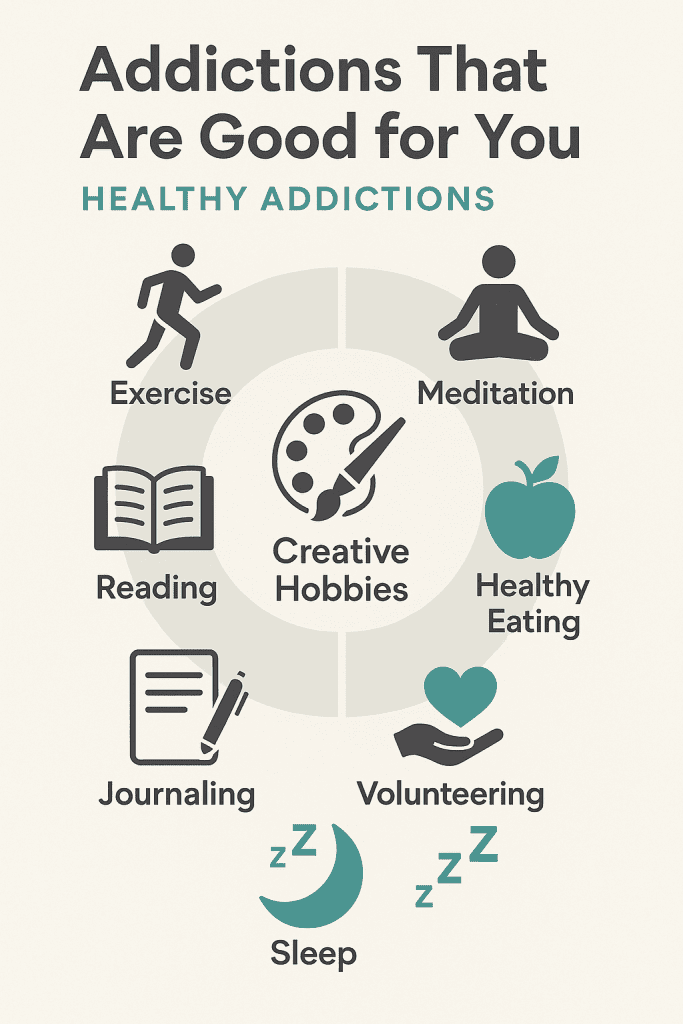Table of Contents
In a culture that often demonizes the idea of addiction, it may come as a surprise that some forms of “addiction” can actually boost well-being. Framing certain habits as healthy addictions or addictions that are good for you doesn’t undermine their importance—it elevates them. Instead of harmful dependencies, these positive behaviors reinforce resilience, productivity, and joy. Whether you’re someone recovering from substance misuse or simply looking to cultivate healthier routines, exploring this concept can inspire meaningful change.
Understanding the Concept of Healthy Addictions
What Makes an Addiction “Healthy”?
In essence, a healthy addiction is an activity or behavior that:
Promotes physical or mental well-being
Is practiced consistently but in moderation
Doesn’t interfere with daily responsibilities or relationships
Provides fulfillment, purpose, or stress relief
This is a stark contrast to unhealthy addictions, which are compulsive, harmful, and unmanaged.
Positive Impact Without the Pitfalls
The benefit of healthy addictions lies in their balanced approach. They enhance mood, sharpen focus, and reduce anxiety—all without the negative consequences that accompany harmful dependencies.
Examples of Addictions That Are Good for You
Here are some widely recognized addictions that are good for you, each fostering well-rounded well-being:
Exercise & Physical Activity
Moderate regular activity, like walking, yoga, or cycling, supports cardiovascular health, boosts endorphins, and reduces stress. As long as it’s balanced and not compulsive, it enhances energy and mood naturally
Mindfulness & Meditation
These practices promote emotional stability, clarity, and stress reduction. They help manage daily life with more calm and intention.
Reading & Learning
Engaging in consistent learning—through reading or other educational pursuits—stimulates cognitive function, improves empathy, and enriches personal growth.
Creative Hobbies
Activities like painting, writing, music, cooking, or crafting ignite joy, cultivate self-expression, and often build confidence.
Healthy Diet & Hydration
Prioritizing nutritious meals and staying hydrated supports physical health and energy, and can even enhance mood and cognitive function.
Journaling & Gratitude Practices
Writing thoughts or expressing gratitude increases self-awareness, reduces anxiety, and nurtures emotional resilience.
Volunteering & Social Connection
Helping others and building positive relationships deepens purpose, enhances self-esteem, and strengthens community ties.
Laughing & Restorative Sleep
Regular laughter releases feel-good endorphins, while adequate sleep restores both body and mind—both essential to a healthy lifestyle.
Freedom Starts Here. Take Back Your Life Today.
Same-Day Admissions in Austin Available.
Why Healthy Addictions Matter
Physical, Mental & Emotional Benefits
Engaging in positive habits builds physical resilience, sharpens thinking, and stabilizes mood. Over time, these behaviors cumulatively enhance overall life quality.
Establishing Healthy Coping Mechanisms
Healthy addictions can replace harmful behaviors—like substance misuse or excessive screen time—by offering productive, fulfilling alternatives.
Achieving Flow & Fulfillment
Activities like creative hobbies or reading can induce “flow”—a state of deep engagement and meaning that energizes rather than exhausts.
Avoiding the Downside—When “Good” Habits Go Too Far
Recognizing the Fine Line to Addiction
Even healthy habits can become unhealthy if they become compulsive. For instance, excessive exercise may lead to injuries or exercise addiction, which shares symptoms with behavioral disorders.
The Times author reflected on how an “addictive personality” can help one adopt healthy habits—but even those can spiral, such as becoming overly fixated on exercise stats
Managing Dopamine and Urges Wisely
While many healthy activities release dopamine (“feel-good” hormone), overreliance on that dopamine boost can foster compulsive behavior. Setting boundaries and practicing mindfulness helps avoid these pitfalls
Making Healthy Addictions Stick
Start Small & Sustainable: Begin with just 10 minutes of activity or one page of reading per day.
Track & Season: Use journals or apps to monitor consistency—sparking motivation through minor achievements.
Align with Values: Choose activities that resonate with your goals—whether it’s stress relief, learning, or community connection.
Seek Balance: Blend multiple healthy habits (like combining walking with journaling) to enhance well-being without overdoing one.
Stay Flexible: Allow yourself to rest or shift focus when needed—avoid rigidity that may lead to stress or burnout.
Addictions that are good for you—like exercising, reading, mindfulness, creative hobbies, or gratitude—hold immense power to transform well-being. What begins as a small, consistent groove can evolve into a positive force for resilience, growth, and fulfillment. By recognizing the difference between healthy engagement and obsession—and by cultivating balance—you can channel that energy into habits that truly serve you.
Healthy addictions bring fulfillment, improve mental or physical well-being, and are practiced in balance. Harmful addictions, however, are compulsive, damaging, and disrupt life.
Yes. Even positive habits like exercise can cross into addiction if done excessively or at the expense of health or relationships.
They replace harmful behaviors with meaningful, constructive routines—including mindfulness, creative hobbies, and volunteerism—that support long-term emotional and mental wellness
They’re characterized by consistent, enjoyable engagement—not craving or dependency—and they don’t compromise autonomy or life balance.
Reflect on activities that align with your values—like physical health, learning, or creativity—start small, and pay attention to how they make you feel.
